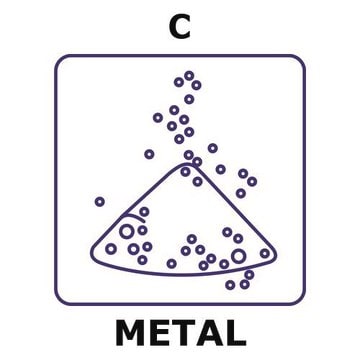633100
Carbon
nanopowder, <100 nm particle size (TEM)
Sinónimos:
Carbon
Iniciar sesiónpara Ver la Fijación de precios por contrato y de la organización
About This Item
Fórmula empírica (notación de Hill):
C
Número de CAS:
Peso molecular:
12.01
Número CE:
Número MDL:
Código UNSPSC:
11101522
ID de la sustancia en PubChem:
NACRES:
NA.23
Productos recomendados
Formulario
nanopowder
superficie
>100 m2/g , BET
tamaño de partícula
<100 nm (TEM)
cadena SMILES
[C]
InChI
1S/C
Clave InChI
OKTJSMMVPCPJKN-UHFFFAOYSA-N
¿Está buscando productos similares? Visita Guía de comparación de productos
Categorías relacionadas
Descripción general
Carbon nanopowder possesses excellent propertiessuch as a huge electroactive surface area, high thermal and electricalconductivity, biocompatibility, and high porosity. It is widely used in thefields of catalysis, adsorbents, electrochemical sensing, bioimaging,reinforcement filler, and renewable energy devices.
Aplicación
Carbon nanopowder can be used:
- To fabricate anode material for a microbial fuel cell for bioelectricity generation.
- To prepare nanopowder embedded graphite paste matrix for electrochemical sensing of biologically active compounds such as raloxifene (anticancer drug).
- To enhance the electromechanical potential of polymer composites thatare used as actuators in telerobotics and medicine.
Nota de preparación
Amorphous materials formed by laser techniques.
Código de clase de almacenamiento
11 - Combustible Solids
Clase de riesgo para el agua (WGK)
WGK 3
Punto de inflamabilidad (°F)
Not applicable
Punto de inflamabilidad (°C)
Not applicable
Elija entre una de las versiones más recientes:
¿Ya tiene este producto?
Encuentre la documentación para los productos que ha comprado recientemente en la Biblioteca de documentos.
Los clientes también vieron
Electrode Materials for Lithium Ion Batteries
Kam KC and Doeff MM
Material Matters, 7(4) (2012)
Edge-carboxylated graphene nanoflakes from nitric acid oxidised arc-discharge material
Salzmann CG, et al.
Journal of Materials Chemistry, 20, 314-319 (2010)
T Southorn et al.
Journal of perioperative practice, 23(6), 144-146 (2013-08-06)
Currently, there are very few provisions for recycling in theatres. We measured the weight of clinical waste for several orthopaedic operations. This waste was then examined and sorted into domestic waste and clinical waste. With staff education it is possible
Nathalie Butt et al.
Ecological applications : a publication of the Ecological Society of America, 23(4), 936-943 (2013-07-20)
A typical way to quantify aboveground carbon in forests is to measure tree diameters and use species-specific allometric equations to estimate biomass and carbon stocks. Using "citizen scientists" to collect data that are usually time-consuming and labor-intensive can play a
Abstracts of the 9th International Conference On Homocysteine and One-Carbon Metabolism - HCY2013. Dublin, Ireland. September 8-12, 2013.
Journal of inherited metabolic disease, 36 Suppl 1, S1-54 (2013-07-25)
Artículos
Solid oxide fuel cells and electrolyzers show potential for chemical-to-electrical energy conversion, despite early development stages.
Nuestro equipo de científicos tiene experiencia en todas las áreas de investigación: Ciencias de la vida, Ciencia de los materiales, Síntesis química, Cromatografía, Analítica y muchas otras.
Póngase en contacto con el Servicio técnico



